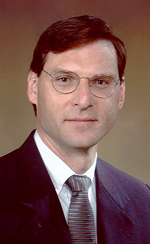Rounds With Ray
 The academic year came to an official close as we celebrated our 171st
Commencement exercises. It was a wonderful event for the entire Medical
University family, and in particular for the more than 700 students who
completed their degree requirements this year. Each of these students now
moves on to new challenges and opportunities in their chosen profession.
The academic year came to an official close as we celebrated our 171st
Commencement exercises. It was a wonderful event for the entire Medical
University family, and in particular for the more than 700 students who
completed their degree requirements this year. Each of these students now
moves on to new challenges and opportunities in their chosen profession.
In much the same way, with the conclusion of the academic year it is time for the university to look forward to new challenges and opportunities. We have come through a difficult transitional year, and during the past few weeks, I have sensed considerable angst among the faculty and staff. Clearly, one factor contributing to these feelings is the change in university leadership. After 17 years of stable leadership, there has been a recent change in the presidency of the university, and several other leadership positions will change over in the near future. Any time that such change occurs, it is bound to raise questions in people’s minds about whether the university will be heading in new and different directions.
Through the inaugural address and other venues, I have presented elements of my vision for the future of the university. Recent questions and comments have made it clear to me, however, that there is a need for greater clarity and specificity. During the coming weeks and months, I will make every effort to communicate more effectively to the faculty and staff on these matters. I also will be interested to hear your thoughts and aspirations for the Medical University.
One of the first opportunities for focused discussion with the faculty will be a Town Hall meeting on Thursday, June 15, at 5 p.m. in the Basic Sciences Auditorium. At that time, I will provide an overview of my aspirations for the Medical University. Equally important, an opportunity will be provided for all faculty members to ask questions and make suggestions. In preparing for this discussion, I would be grateful to anyone who might be willing to share with me in advance his or her personal thoughts and concerns. Your correspondence can be directed to me at greenber@musc.edu or through regular campus mail. Also, a special location within the President’s Page on the University Website will be set up for this purpose. I hope that you will share your thoughts with me and I look forward to meeting with as many of the faculty as possible on June 15.
A second factor that is contributing to our present collective angst is the financial pressure under which we are operating. As most of you know, the roots of the present situation can be traced back to the Balanced Budget Act of 1997. That legislation has hit teaching hospitals such as ours particularly hard because of reduced funding for care of uninsured patients and for educational expenses. The problems of teaching hospitals are well documented in a recent issue of the Journal of the American Medical Association.
We are attempting to address these financial issues in several ways. First, the hospital authority, scheduled for implementation on July 1, will allow us to operate the medical center in a more efficient manner. Second, the state budget presently is being debated on the floor of the Senate. We are hoping to encourage the Senate to agree to the considerable relief that the House recommended in its budget. Third, we are working to encourage our congressional delegation in Washington to support legislation to restore some of the reductions produced by the Balanced Budget Act.
A third factor that has contributed to the current uncertainty is the recent decision of several faculty members to leave the Medical University. Some of these individuals have decided to enter the private practice of medicine and others have accepted jobs at other academic health centers. Although faculty departures occur with some regularity, there is a widespread impression that the number of current resignations is greater than normal. Equally important, a number of the departing faculty members are among our most productive clinicians. Without question, their patients, students, and colleagues here will miss these individuals.
I have met with several of the departing faculty to better understand the factors contributing to their decisions to leave. As might be expected, each of these individuals has his or her own particular rationale for pursuing other options. Nevertheless, I am fully committed to identifying and addressing features of the university environment that will make this a more attractive place for our faculty and staff to pursue their careers.
Again, I encourage you to contact me if you have thoughts on such initiatives.
I will have much more to say on these and other matters in my remarks on June 15. In the meantime, however, I want to emphasize that we must be committed to the pursuit of excellence in all three components of our mission—education, research, and clinical service. As these dimensions of our institution are so interrelated, achieving excellence in any one requires that we be outstanding in the others as well. We cannot afford to lose the momentum that we have gained over the past few years and we will redouble our efforts to set even higher goals in the years ahead. I look forward to hearing your thoughts and to working with you to make the Medical University the premier academic health center that South Carolina deserves.